In this article:
Smoking has numerous negative effects on human health. While most people know about the dangers of smoking for lung health, not many are aware of its negative effects on the skin.
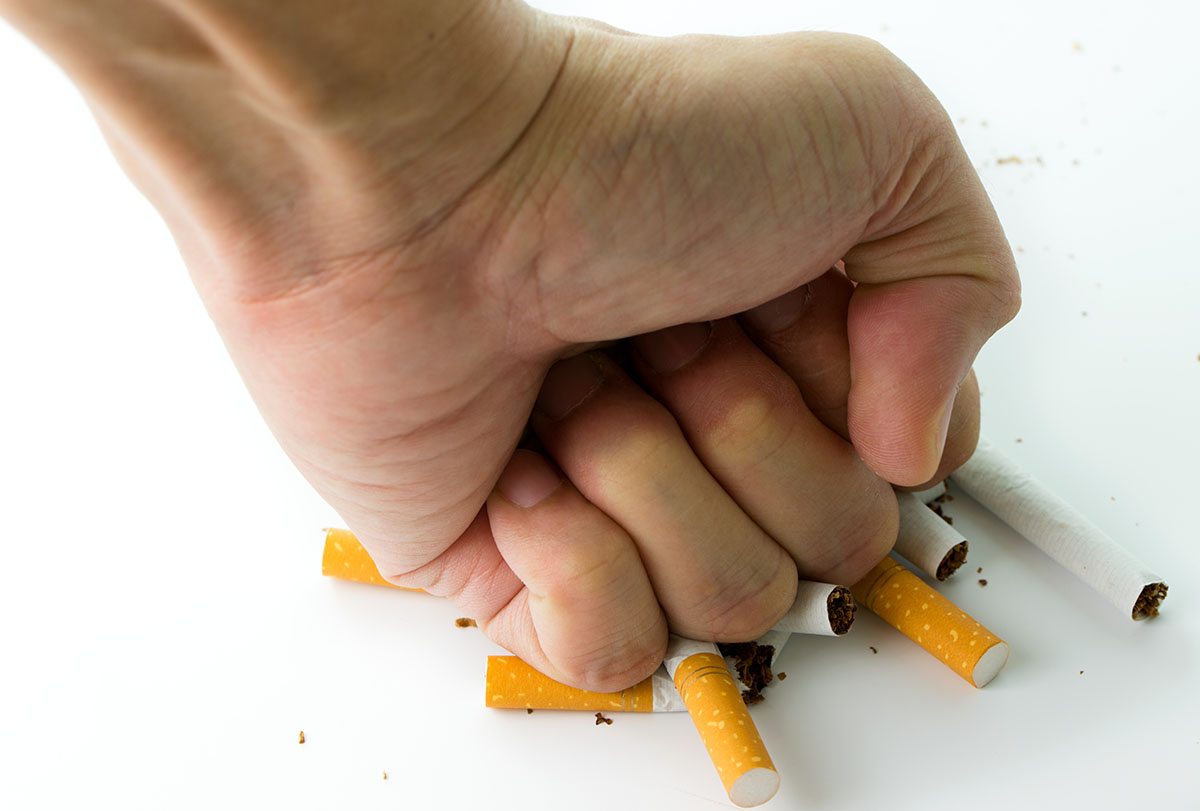
This article will explore the benefits of quitting smoking on skin health and the scientific evidence that supports these benefits.
Why Quitting Smoking Is Good for Your Skin
Smoking can lead to various skin-related issues, which is why quitting smoking can have numerous benefits for skin health. Here are some of them.
1. Reduces signs of premature aging
One of the most noticeable effects of smoking on skin health is premature aging. Smoking causes the skin to lose elasticity and firmness, which can result in wrinkles, fine lines, and drooping.
Research has shown that tobacco smoke contains numerous harmful chemicals and toxins that can damage the skin’s collagen and elastin fibers, which are crucial for strengthening the skin’s elasticity.
A study also found that tobacco smoke causes premature skin aging, resulting in wrinkles, fine lines, and uneven skin tone. The study also revealed that smokers have significantly lower levels of collagen and higher levels of oxidative stress in their skin, which further exacerbates the damage caused by smoking.
Furthermore, studies have revealed that the skin of individuals who smoke heavily can exhibit signs of aging that are comparable to those seen in nonsmokers who are much older.
For example, a smoker who is only 40 years old may have skin that looks similar to that of a nonsmoker who is 70 years old. Unfortunately, the skin damage caused by smoking is often irreversible, meaning that quitting smoking is essential for avoiding further damage.
So, quitting smoking can help save you from the problematic signs of premature aging. (1)(2)(3)
2. Helps fight a dull complexion
Quitting smoking can also lead to an improvement in skin tone because cigarettes can cause a dull, tired complexion.
A study found that when people quit smoking, their skin can start to look and feel younger in as little as 3 months. A study also showed that people’s biological skin age improved quickly after quitting smoking, and this improvement was maintained for at least 9 months.
Additionally, quitting smoking can improve the color of your skin. The study found that skin color changes occurred within 1 month after quitting smoking, which is important because most people want their skin to look attractive. This improvement in skin color can be a great motivator for people to quit smoking and stay tobacco-free. (4)
3. Improves skin healing
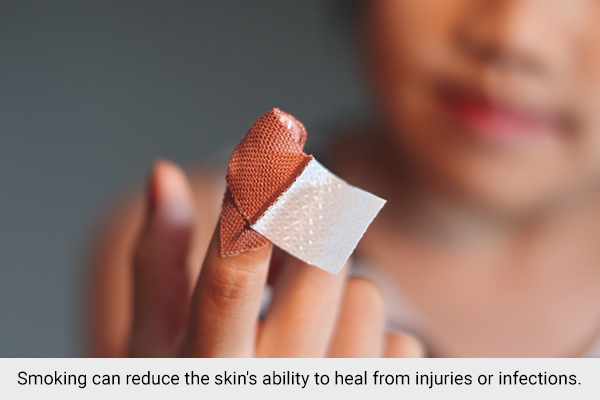
Smoking can reduce the skin’s ability to heal from injuries or infections. In short, smoking cigarettes can have adverse effects on wound healing.
The harmful substances in cigarette smoke, such as nicotine, carbon monoxide, and hydrogen cyanide, can hinder the healing process of wounds.
Nicotine can constrict blood vessels, reducing blood circulation to the skin, causing tissue ischemia and slowing down healing. Nicotine also increases the risk of blood clots and impairs the function of important cells needed for healing, such as red blood cells, fibroblasts, and macrophages.
Carbon monoxide and hydrogen cyanide diminish oxygen transport and metabolism.
Clinically, smokers have shown slower healing of wounds resulting from trauma, disease, or surgery. Also, smokers have an elevated chance of impaired healing compared to nonsmokers.
It’s essential to advise smokers to quit smoking, especially before elective surgery or when healing from wounds. (5)
4. Promotes collagen production
When you smoke cigarettes, your skin produces less type I and III collagen. These collagen types help to keep your skin strong and healthy.
Studies have shown types I and III collagen were reduced with a whopping rate of 18% and 22%, respectively, in smokers in comparison to nonsmokers.
When you quit smoking, your skin can start to produce more of these types of collagen again. This can help your skin to look and feel better and may decrease the formation of wrinkles and other indications of aging. (6)
5. Reduces inflammation and acne
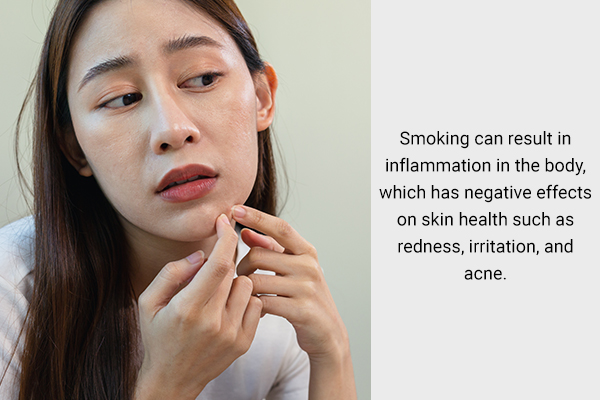
Smoking can also result in inflammation in the body, which has negative effects on skin health such as redness, irritation, and acne.
After puberty, acne may still occur, which is a common inflammatory condition that affects the skin. Studies have shown that smoking is directly linked to the noninflammatory type of post-pubertal acne, known as APAA (atypical post-adolescent acne) or “smoker’s acne.”
APAA typically presents as mild to moderate acne; it is commonly found on the chin, lower jaw, and neck and is more common among smokers.
It is important to recognize this form of acne to provide accurate information on the effects of smoking on the skin, especially among adolescents who are more concerned with their appearance. (7)
6. Improves blood circulation
Smoking can reduce circulation in the body, which can lead to a shortage of oxygen and necessary nutrition in the skin. Therefore, quitting smoking can lead to an improvement in circulation, which can help enhance skin health.
Smoking can induce harm to the blood vessels in your body, including those in your skin. Even smoking a single cigarette can decrease blood flow in the skin. This happens to both smokers and nonsmokers, with smokers experiencing a greater reduction in blood flow.
Interestingly, nonsmokers recover faster than smokers, with their blood flow returning to normal within 2 minutes, while it takes 5 minutes for smokers. This suggests that the blood vessels of smokers become less responsive to smoke over time.
Therefore, quitting smoking can help promote better skin health. (8)
7. Decreases puffiness around the eyes
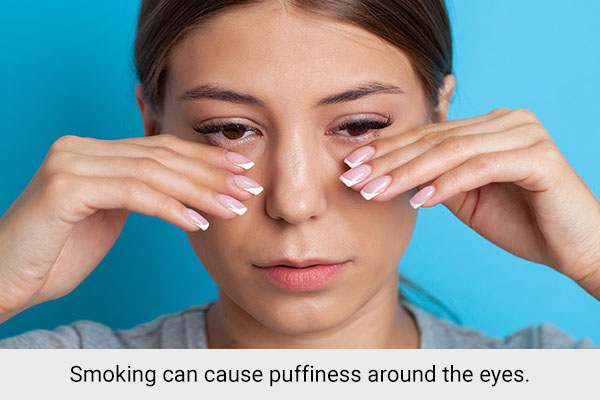
Smoking can cause puffiness around the eyes. Studies have shown that even women with a short smoking history are more likely to have puffiness under their eyes than nonsmokers.
Smoking is also linked to a more severe case of under-eye puffiness. This is because smoking can cause changes to the skin, such as impairment of collagen production and collagen breakdown, which can result in volume loss. When there is volume loss, features such as under-eye puffiness become more noticeable.
Quitting smoking can help lessen the intensity of under-eye puffiness and prevent further damage to the skin. (9)
8. Reduces the risk of psoriasis
Psoriasis is a common skin problem that is characterized by red, scaly patches on the skin. Smoking has been correlated with a greater chance of psoriasis, and quitting smoking can reduce the risk of developing this condition.
The link between psoriasis and smoking may be due to various factors such as oxidative stress, signaling pathway interactions, and vascular effects.
Dermatologists can help reduce the impact of smoking on patients by encouraging them to quit smoking. (10)
9. Reduces the risk of rosacea
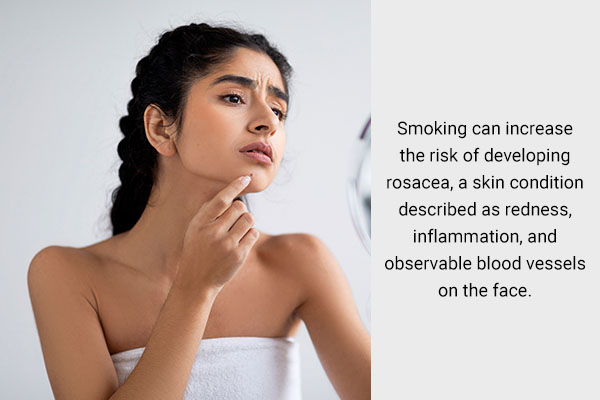
Smoking can weaken the immune system and reduce the body’s capacity to combat infections.
Additionally, nicotine, a key component in tobacco, can cause constriction of blood vessels in the skin, leading to reduced oxygen levels and promoting the development of new blood vessels. This may increase the risk of developing rosacea, a skin condition described as redness, inflammation, and observable blood vessels on the face.
Therefore, giving up smoking may help decrease the threat of developing inflammatory skin conditions such as rosacea. (11)
10. Reduces the risk of skin cancer
A study found that there is a link between smoking and squamous cell carcinoma of the skin. The study showed that smokers have a higher risk of developing skin cancer than nonsmokers, with existing smokers having an increased risk than ex-smokers.
The study also found that the more cigarettes and pipes a person smoked, the higher their risk of developing skin cancer.
The research concluded that smoking is an autonomous risk factor for cutaneous squamous cell carcinoma. (12)
So, giving up smoking can help lower the risk of developing skin cancer.
Most-Asked Questions
How long does it take for the skin to get better after quitting smoking?
According to dermatologists, it can take from a few days to several months for the skin to improve after quitting smoking. The exact timeline depends on several factors such as how old the person is, how long they smoked, and how heavily they smoked.
Can quitting smoking reverse the signs of aging on the skin?
While quitting smoking can’t completely reverse the signs of aging on the skin, it can help to slow down the aging process and improve the appearance of the skin.
Can quitting smoking improve acne-prone skin?
Yes, quitting smoking can improve acne-prone skin by reducing inflammation in the body.
What skin care products can help improve skin health after quitting smoking?
While there are no specific skin care products that are designed specifically for improving skin health after quitting smoking, using a daily moisturizer and sunscreen can help to protect the skin from further damage and promote healing.
Final Word
Quitting smoking can have numerous benefits for skin health. It can improve collagen production, reduce inflammation, improve circulation, reduce puffiness, and reduce the risk of psoriasis and rosacea.
Ceasing this unhealthy habit can have significant benefits for your skin health and overall well-being.
- Was this article helpful?
- YES, THANKS!NOT REALLY


